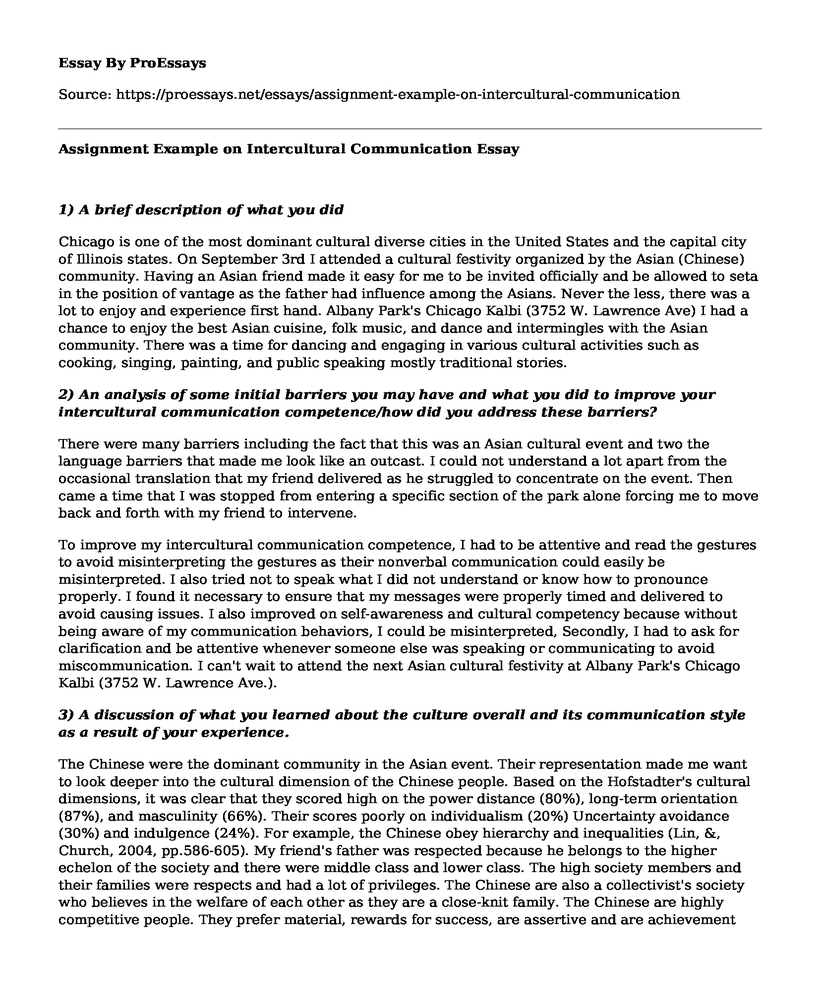1) A brief description of what you did
Chicago is one of the most dominant cultural diverse cities in the United States and the capital city of Illinois states. On September 3rd I attended a cultural festivity organized by the Asian (Chinese) community. Having an Asian friend made it easy for me to be invited officially and be allowed to seta in the position of vantage as the father had influence among the Asians. Never the less, there was a lot to enjoy and experience first hand. Albany Park's Chicago Kalbi (3752 W. Lawrence Ave) I had a chance to enjoy the best Asian cuisine, folk music, and dance and intermingles with the Asian community. There was a time for dancing and engaging in various cultural activities such as cooking, singing, painting, and public speaking mostly traditional stories.
2) An analysis of some initial barriers you may have and what you did to improve your intercultural communication competence/how did you address these barriers?
There were many barriers including the fact that this was an Asian cultural event and two the language barriers that made me look like an outcast. I could not understand a lot apart from the occasional translation that my friend delivered as he struggled to concentrate on the event. Then came a time that I was stopped from entering a specific section of the park alone forcing me to move back and forth with my friend to intervene.
To improve my intercultural communication competence, I had to be attentive and read the gestures to avoid misinterpreting the gestures as their nonverbal communication could easily be misinterpreted. I also tried not to speak what I did not understand or know how to pronounce properly. I found it necessary to ensure that my messages were properly timed and delivered to avoid causing issues. I also improved on self-awareness and cultural competency because without being aware of my communication behaviors, I could be misinterpreted, Secondly, I had to ask for clarification and be attentive whenever someone else was speaking or communicating to avoid miscommunication. I can't wait to attend the next Asian cultural festivity at Albany Park's Chicago Kalbi (3752 W. Lawrence Ave.).
3) A discussion of what you learned about the culture overall and its communication style as a result of your experience.
The Chinese were the dominant community in the Asian event. Their representation made me want to look deeper into the cultural dimension of the Chinese people. Based on the Hofstadter's cultural dimensions, it was clear that they scored high on the power distance (80%), long-term orientation (87%), and masculinity (66%). Their scores poorly on individualism (20%) Uncertainty avoidance (30%) and indulgence (24%). For example, the Chinese obey hierarchy and inequalities (Lin, &, Church, 2004, pp.586-605). My friend's father was respected because he belongs to the higher echelon of the society and there were middle class and lower class. The high society members and their families were respects and had a lot of privileges. The Chinese are also a collectivist's society who believes in the welfare of each other as they are a close-knit family. The Chinese are highly competitive people. They prefer material, rewards for success, are assertive and are achievement oriented.
The Chinese score low on uncertainty avoidance because they do not have rigid codes of belief and behaviors (Hofstede, &, Bond, 1998). They tolerate all forms of unorthodox ideas. Their relaxed attitudes made it easy for me to interact with them at the event. The Chinese also score high on the long-term orientation dimensions because they do not maintain time-honored tradition. The traditional event is less often because they are thrifty and prefer educating their children as a way of preparing their children for the future. The Chinese also scored low on the indulgence versus restraints dimensions because they suppress and regulate their gratification, prefer rewards for performing their jobs well and can easily develop emotions for unfair treatment. Understanding the cultural dimension would help me to be culturally competent next time.
Reference
Hofstede, G., &, Bond, H. (1998). The Confucius Connection: From cultural roots to economic growth, Organisational Dynamics, Spring 1998, 5-2
Lin, E., &, Church, A. (2004). Are Indigenous Chinese Personality Dimensions Culture-Specific?. Journal of Cross-Cultural Psychology, 35(5), pp.586-605.
Cite this page
Assignment Example on Intercultural Communication. (2022, Aug 15). Retrieved from https://proessays.net/essays/assignment-example-on-intercultural-communication
If you are the original author of this essay and no longer wish to have it published on the ProEssays website, please click below to request its removal:
- Essay Sample on Cultural Diversity and Impacts
- Paper Example on Stigmatization of Jail Victims: 5-Year Evaluation Study
- Essay on Cultural Heritage of China: Crucial for Nation's Development & Survival
- Trust: A Gender Difference in Return and Behavior - Essay Sample
- Indigenous Women's Power & Authority Vs. French/British Settlers - Essay Sample
- Identity Shaping: Social, Genetic, Cultural, and Built Environment - Essay Sample
- Attachment Theory: Understanding the Parent-Child Bond Across Time & Space - Essay Sample







